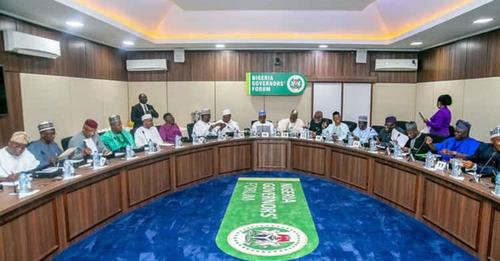Business
Governors to stop the sale of 10 power facilities because of the electricity crisis

Under the direction of the Nigeria Governors’ Forum (NGF), governors have filed legal actions to halt the privatization of several power facilities.
The NGF stated in a statement that legal action has been launched to stop the Federal Government from selling 10 National Integrated Power Projects (NIPPs).
The communiqué was released yesterday following the governors’ teleconference on Tuesday.
Aminu Tambuwal, the governor of Sokoto State and chairman of the NGF, signed it.
The governors also asked that the court be allowed to decide the issue about the $418 million Paris Club return fee that the Federal Government intends to pay to selected consultants.
The governors did not include the NIPPs in question on their list.
In contrast, a fast-track strategy for the privatization of five power plants was approved in April 2021 by the National Council on Privatization (NCP).
They are the power plants at Calabar, Geregu, Omotosho, Ihovbor, and Olorunsogo.
The Niger Delta Electricity Holding Company (NDPHC), a government-owned power generation and distribution firm, is in charge of managing the NIPPs’ installation.
Benin Generation Company Limited, Calabar Generation Company Limited, Egbema Generation Company Limited, Gbarain Generation Company Limited, Geregu Generation Company Limited, Ogorode Generation Company Limited, Olorunsogo Generation Company Limited, Omoku Generation Company Limited, Omotosho Generation Company Limited, and Alaoji Generation Company Limited are the 10 stations that are going through privatization processes.
According to the NGF statement, “The Forum, following its advocacy that the Federal Government of Nigeria’s (FGN) proposed privatization of 10 National Integrated Power Projects (NIPPs) should be stopped, instructed its lawyers to approach the Federal High Court which, at the moment, has issued a court order prohibiting all parties in the suit from taking any step or action that will make or render the outcome of the motion on notice seeking an interlocutory injunction n
According to the court’s judgment, the proposed sale of the power plants owned by the Niger Delta Power Holding Company Limited (NDPHCL) by the respondents is halted pending the outcome of the hearing on the application on notice for an interlocutory injunction.
Regarding the contentious $418 million Paris Club Refund fee and promissory notes issued to consultants by the Federal Ministry of Finance and the Debt Management Office (DMO), the NGF stated: “Regarding the $418 million Paris Club Refund and promissory notes issued to consultants by the Federal Ministry of Finance and the Debt Management Office (DMO), the forum remains resolute in exploring all legal channels available to it in order to ensure that resources belonging to states are not unfairly or illegally paid to
The NGF stated that it was collaborating with the Federal Government and its agencies to assist victims of the recent flooding that devastated homes and farmlands and killed hundreds of lives across states.
Following discussions between sub-sovereigns at the just-concluded 2nd African Sub-Sovereign Government Network (AfSNET) conference, the forum decided to pursue support for improved dialogue, cooperation, and collaboration between sub-sovereign governments around intra-African trade, investment, industrialization, and development through its membership in the Forum of Regions of Africa (FORAF) and its partnership with the African Export-Import (AFREXIM) Bank.
“Following discussions with states and the National Economic Council (NEC) Ad-hoc Committee on Flooding, members were also briefed by the World Bank Task Team Leader (TTL), Professor Foluso Okunmadewa, on the desired restructuring of the $750 million Nigeria COVID-19 Action Recovery and Economic Stimulus Program (CARES) program to respond to Nigeria 2022 Flood Response.
“The restructure will let States redistribute money from the program for quick help with assets, basic services, and means of subsistence.
As the flood subsides, the states will be able to support, among other things, household enterprise recovery grants, short-term relocation of displaced households, labor-intensive opportunities for unskilled labor, infrastructure restoration for basic services, infrastructure restoration for damaged agricultural infrastructure, and infrastructure restoration for destroyed wet markets.
“The conference heard an update from Olanrewaju Ajogbasile, senior program manager for the NGF States Fiscal Transparency Accountability and Sustainability (SFTAS) Technical Assistance Program, on the SFTAS program’s implementation status as it enters the last stage of yearly evaluations.
